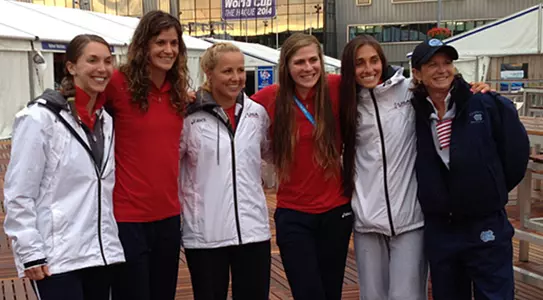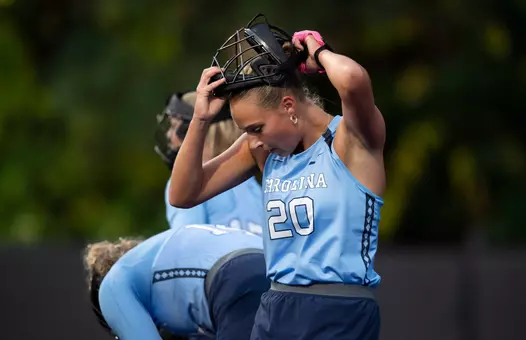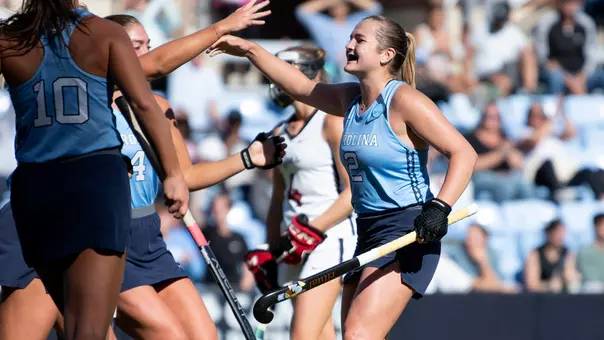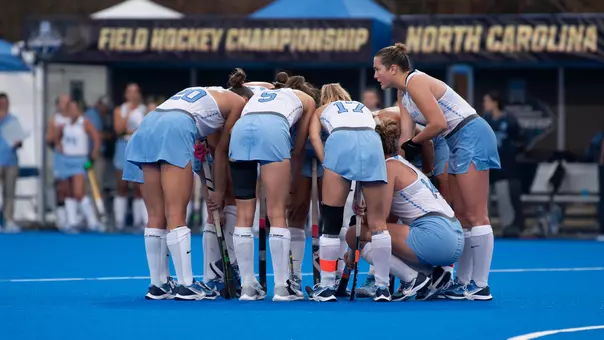University of North Carolina Athletics

My Carolina Experience: Karen Shelton
July 15, 2015 | Field Hockey
My Carolina Experience: Karen Shelton
By Zoya Johnson, GoHeels.com
Karen Shelton was born the middle child of a large army family in Honolulu, Hawaii. Sandwiched by three of her brothers, she inevitably grew up tagging along with them and became somewhat of a tomboy. Due to her father being a career military officer the family called many states their home until he retired as a lieutenant, when Shelton was in the fifth grade.
When she was in the seventh grade, organized sports were made available for girls. Her family had just moved to Pennsylvania, the field hockey hotbed of the U.S., and a friend asked her to try out for their junior high school team.
From that point on, Shelton feels she was lucky to have great coaches. Though she credits her brothers with instilling her with toughness, her coaches helped her fall in love with the game. She went on to play in high school and attended a summer camp with counselors who played for West Chester University.
One of the counselors at that camp just so happened to be Nancy Stephens, a field hockey legend as a player, who went on to become a force as a coach and who is the current head coach at the University of Connecticut. Stephens was a senior at West Chester when Shelton was still in high school, but it was Stephens' mentorship that got Shelton thinking about attending the university herself.
The head coach at West Chester, Vonnie Gros, who was also the U.S. National Team Coach at the time, was quickly making a name for herself as one of the best coaches in the world. Simultaneously, Gros was also spearheading the revolution of the game, and had turned West Chester University into the premier institution for field hockey in the U.S.
Between her mentor and soon-to-be coach, it seems that Shelton attending West Chester was preordained in some fashion, as it was also a well-known teaching university and she knew at that point that that was something she was interested in. It made sense for her on many different levels, and so Shelton joined Gros and the team in 1975.
“In those days, freshmen were not allowed on the varsity team so I worked hard to earn a spot in my sophomore year,” Shelton said. “Subsequently, that year I also earned a spot on the National Team.” Shelton's progress continued until she became one of the best field hockey players in the country.
Named the national field hockey player of the year three times, Shelton led three NCAA Championship winning teams, and found time to win an NCAA Championship for West Chester lacrosse as well. Playing for the U.S. National Team from 1977-1984, Shelton also earned a spot on two U.S. Olympic Teams.
She graduated with a bachelor's degree in health and physical education in 1979, then spent one year as the assistant coach at Franklin & Marshall College. “I got a call from Dolly Hunter, who was the head coach at the University of North Carolina, recruiting me to take her place,” Shelton said. “I was still on the national team and I wanted to keep playing, so at first I wasn't interested but Dolly insisted that I just drive down and take a look.
“It was like as soon as I got on campus I knew I would love to take the job, and I started envisioning the type of program we could build. I had a chance to take in the beauty of the campus and even scrimmaged with some of the girls and Anson Dorrance.”
Because the program wasn't as developed as it is now, Shelton was able to keep playing on the U.S. National Team after getting hired in 1981. She did so until 1984, when she helped the U.S. to a bronze medal at the Los Angeles Olympics. Shortly after, Shelton retired and began investing all her experience and knowledge in her career at Carolina. By 1986 the field hockey program made its first final four, and her teams have been a consistent force on the national stage ever since.
Shelton's philosophy of creating a competitive wining culture while reinforcing the fundamentals of the game has garnered six national titles, and 18 Atlantic Coast Conference championships. Her success and dedication have earned her spots in many halls of fame as both a player and a coach. They have also earned her prestigious awards like UNC's C. Knox Massey Distinguished Service Award, in recognition of her longtime service and dedication to the University.
Shelton's decorated and celebrated career as a coach and ambassador for the university has also earned her induction to The Order of the Golden Fleece. She says, “It is an incredible honor to be recognized by the university's oldest honor society, and even more so because I didn't have the honor of going to school here.”
When it comes to recruiting young women for UNC, Shelton tries not to be pushy because the university sells itself. Much like what she felt when she first drove down to Carolina, she feels recruits know when they are meant to be here. “I've always felt that this is the University of North Carolina, and our program can attract great athletes because of that,” she says. “It is a place where solid athletes want to grow, learn, and develop. I feel privileged to have the continued opportunity to work with them and to help them grow as students, athletes and young women. That's been the real highlight, to have the chance to be competitive and win a few championships along the way is just an added bonus.
“One of the things we talk to prospects about is our track record in developing players that are not only competitive and successful here but that go on to the national team. Anson (Dorrance) talks about his program being a competitive cauldron. I feel we have one much the same. Currently our national team has five former players on it and a sixth is an alternate. We have five on the junior national team and a lot of these kids were not heavily recruited. They come here, they're trained well, they're surrounded by good people, and they learn a culture that sets them up for success in everything they do.
“We foster their passion for the game, and set them up to be athletes for life. They don't get burnt out because they have a better understanding of how to fuel and condition themselves, as well as a deeper love for the game and the team. These student-athletes go on to be anything from international players, doctors, and successful businesswomen, to teachers.
“What has been a great motivator for me is to try and have our program bring even more distinction to UNC. I want to be one of those programs that people can brag on because I love it so much. I realize that the decision to drive down here absolutely changed my life for the better. I met my husband Willie Scroggs, who recently retired as a senior associate athletic director at UNC. He coached the Carolina men's lacrosse team from 1979-90, a span that included three NCAA titles.
“Here, I've been able to see our son grow and go to school here, and thanks to UNC I have had the opportunity to grow as a coach and as a person. I've been granted a family within the university, made up of great coaches and administrators, and it has all been an incredible blessing.”












